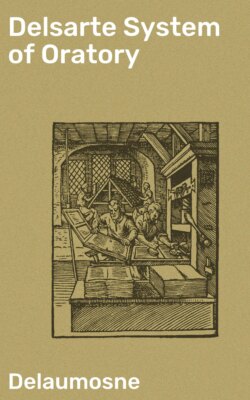Читать книгу Delsarte System of Oratory - Delaumosne - Страница 29
На сайте Литреса книга снята с продажи.
Oratorical Value of Gesture.
ОглавлениеThe true aim of art is to move, to interest and to persuade. Emotion, interest and persuasion are the first terms of art. Emotion is expressed by the voice, by sounds; interest, by language; persuasion is the office of gesture.
To inflection belongs emotion through the beautiful; to logic, interest through the truth; to plastic art, persuasion through the good.
Gesture is more than speech. It is not what we say that persuades, but the manner of saying it. The mind can be interested by speech, it must be persuaded by gesture. If the face bears no sign of persuasion, we do not persuade.
Why at first sight does a person awaken our sympathy or antipathy? We do not understand why, but it is by reason of his gestures.
Speech is inferior to gesture, because it corresponds to the phenomena of mind; gesture is the agent of the heart, it is the persuasive agent.
Articulate language is weak because it is successive. It must be enunciated phrase by phrase; by words, syllables, letters, consonants and vowels--and these do not end it. That which demands a volume is uttered by a single gesture. A hundred pages do not say what a simple movement may express, because this simple movement expresses our whole being. Gesture is the direct agent of the soul, while language is analytic and successive. The leading quality of mind is number; it is to speculate, to reckon, while gesture grasps everything by intuition,--sentiment as well as contemplation. There is something marvelous in this language, because it has relations with another sphere; it is the world of grace.
An audience must not be supposed to resemble an individual. A man of the greatest intelligence finding himself in an audience, is no longer himself. An audience is never intelligent; it is a multiple being, composed of sense and sentiment. The greater the numbers, the less intelligence has to do. To seek to act upon an individual by gesture would be absurd. The reverse is true with an audience; it is persuaded not by reasoning, but by gesture.
There is here a current none can control. We applaud disagreeable things in spite of ourselves--things we should condemn, were they said to us in private. The audience is not composed of intellectual people, but of people with senses and hearts. As sentiment is the highest thing in art, it should be applied to gesture.
If the gestures are good, the most wretched speaking is tolerated. So much the better if the speaking is good, but gesture is the all-important thing. Gesture is superior to each of the other languages, because it embraces the constituent parts of our being. Gesture includes everything within us. Sound is the gesture of the vocal apparatus. The consonants and vowels are the gesture of the buccal apparatus, and gesture, properly so called, is the product of the myological apparatus.
It is not ideas that move the masses; it is gestures.
We easily reach the heart and soul through the senses. Music acts especially on the senses. It purifies them, it gives intelligence to the hand, it disposes the heart to prayer. The three languages may each move, interest and persuade.
Language is a sort of music which moves us through vocal expression; it is besides normal through the gesture of articulation. No language is exclusive. All interpenetrate and communicate their action. The action of music is general.
The mind and the life are active only for the satisfaction of the heart; then, since the heart controls all our actions, gesture must control all other languages.
Gesture is magnetic, speech is not so. Through gesture we subdue the most ferocious animals.
The ancients were not ignorant of this all-powerful empire of gesture over an audience. Therefore, sometimes to paralyze, sometimes to augment this magic power, orators were obliged to cover their faces with a mask, when about to speak in public. The judges of the Areopagus well knew the power of gesture, and to avoid its seductions, they adopted the resource of hearing pleas only in the darkness.
The sign of the cross made at the opening of a sermon often has great effect upon good Catholics. Let a priest with his eyes concentric and introspective make deliberately the sign of the cross while solemnly uttering these words: "In-the-name-of-the-Father;" then let his glance sweep the audience. What do they think of him? This is no longer an ordinary man; he seems clothed with the majesty of God, whose orders he has just received, and in whose name he brings them. This idea gives him strength and assurance, and his audience respect and docility.
